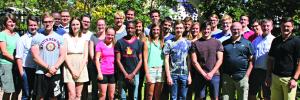
Being brave in a ‘Brave New World’
"O brave new world, that has such people in it!" Borrowed from Shakespeare's The Tempest, the line titles Aldous Huxley's famed techno-dystopian novel published in 1932, Brave New World.
Taking their cue from Huxley's implicit challenge of thinking the world otherwise, on Wednesday 23 November, 26 students forming the Stellenbosch University (SU) – Katholieke University Leuven (KU Leuven) Think Tank 2016, presented their findings to students and staff at STIAS Wallenberg Research Centre, on the theme "Brave New World? Merging technology and society: opportunities, challenges and threats for the quality of life."
Opening the event, Prof Hester Klopper, Vice-Rector for Strategic Initiatives and Internationalisation referred to the "Fourth Industrial Revolution," the name given to this stage in human development where a technological revolution has begun to exponentially re-shape the complexities of social existence in a globalised world. With the capacity to drastically improve the quality of human life, or exacerbate growing inequality, "the challenges and opportunities posed by this unprecedented period of transformation must be engaged from a variety of stakeholders," she said.
Toward this end, as part of Stellenbosch University's (SU) preferential partnership agreement with KU Leuven, the Think Tank programme brings together students from both universities in a co-curricular learning experience. The programme is hosted by the Frederik Van Zyl Slabbert (FVZS) Institute and Stellenbosch University International. Thirteen students were represented from each university and began their collaboration at the beginning of this year. After a series of online facilitated workshops, guest lectures and personal research, the programme culminated in Stellenbosch from 12 to 24 November, with the students meeting for the first time in person to further engage and prepare for their final presentation.
Following a fictional debate-style format, the group identified three sub-themes; healthcare, education and social media, and argued their findings from the position of a human-centred' versus a technological approach. Through an online voting system and a combination of wit and humour the audience were engaged in a lively and thoughtful discussion into the pertinent issues of our time.
Should social media be censored, or is it a healthy tool for the dissemination of ideas? Does medical technology overstep or aid the boundaries of human evolution? Can open source learning stimulate education or does it retract from the human element in pedagogy?
These were some of the questions "that kept me up at night for the last year," said Aude Van Oosterwyck, a medical student from KU Leuven. She said "that one of the most difficult parts of the collaboration was finding common ground considering our different backgrounds," but that the nature of the Think Tank itself "exposes you to different perspectives, to theologians, engineers, architects - and that was invaluable".
Similarly, Lynton Spies, a master's student in theology from SU, recalled during the cocktail that followed, "what a great joy it was to be a part of broadening their [Leuven students] perspectives, and to see their genuine receptiveness of the challenges facing South Africa". It was, he said, "in a sense that they were open to coming into our world, just as we were open to experiencing theirs. Maybe this is what it truly means to be brave in a Brave New World".
